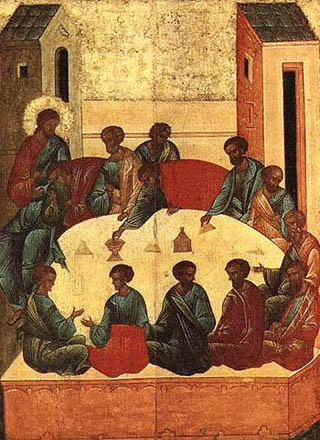
Maundy Thursday or Holy Thursday, among other names, is the day during Holy Week that commemorates the Washing of the Feet (Maundy) and Last Supper of Jesus Christ with the Apostles, as described in the canonical gospels.

Holy Week is the most sacred week in the liturgical year in Christianity. For all Christian traditions, it is a moveable observance. In Eastern Christianity, which also calls it Great Week, it is the week following Great Lent and Lazarus Saturday, starting on the evening of Palm Sunday and concluding on the evening of Great Saturday. In Western Christianity, Holy Week is the sixth and last week of Lent, beginning with Palm Sunday and concluding on Holy Saturday.
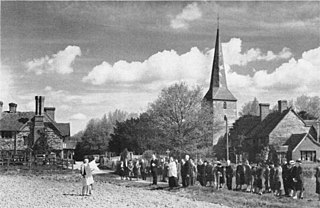
Rogation days are days of prayer and fasting in Western Christianity. They are observed with processions and the Litany of the Saints. The so-called major rogation is held on 25 April; the minor rogations are held on Monday to Wednesday preceding Ascension Thursday. The word rogation comes from the Latin verb rogare, meaning "to ask", which reflects the beseeching of God for the appeasement of his anger and for protection from calamities.

The Paschal Triduum or Easter Triduum, Holy Triduum, or the Three Days, is the period of three days that begins with the liturgy on the evening of Maundy Thursday, reaches its high point in the Easter Vigil, and closes with evening prayer on Easter Sunday. It is a moveable observance recalling the Passion, Crucifixion, Death, burial, and Resurrection of Jesus, as portrayed in the canonical Gospels.

Genuflection or genuflexion is the act of bending a knee to the ground, as distinguished from kneeling which more strictly involves both knees. From early times, it has been a gesture of deep respect for a superior. Today, the gesture is common in the Christian religious practices of the Anglicanism, Lutheranism, the Catholic Church, and Western Rite Orthodoxy. The Latin word genuflectio, from which the English word is derived, originally meant kneeling with both knees rather than the rapid dropping to one knee and immediately rising that became customary in Western Europe in the Middle Ages. It is often referred to as "going down on one knee" or "bowing the knee". In Western culture, one genuflects on the left knee to a human dignitary, whether ecclesiastical or civil, while, in Christian churches and chapels, one genuflects on the right knee when the Sacrament is not exposed but in a tabernacle or veiled.
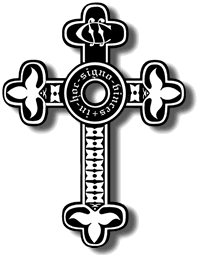
The Society of the Holy Cross is an international Anglo-Catholic society of male priests with members in the Anglican Communion and the Continuing Anglican movement, who live under a common rule of life that informs their priestly ministry and charism.

The Guild of All Souls is an Anglican devotional society dedicated to prayer for faithful departed Christians. As stated on its website, it is a "devotional society praying for the souls of the Faithful Departed, and teaching the Catholic doctrine of the Communion of Saints."
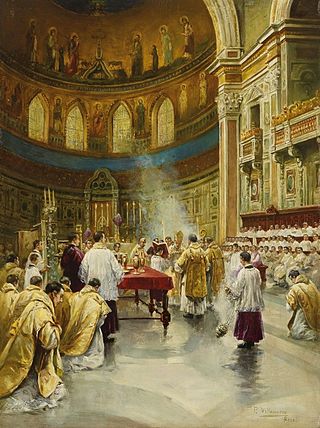
The Chrism Mass is a religious service held in certain Christian denominations, such as Roman Catholicism, Lutheranism, and Anglicanism. It is usually celebrated each year on Maundy Thursday or on another day of Holy Week. During the ceremony, the holy oils used for sacraments and rituals are blessed or consecrated.
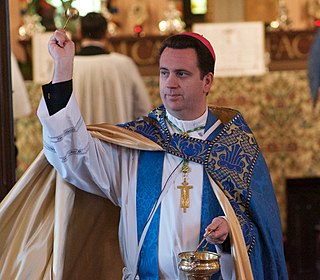
Asperges is the rite of sprinkling a congregation with holy water. The name comes from the first word in the 9th verse of Psalm 51 in the Latin translation which is sung during the traditional form of the rite except during Eastertide. The 51st Psalm is also one of the antiphons that may be sung in the rite under the Mass of Paul VI.
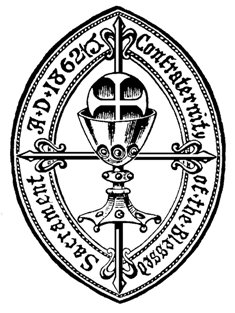
The Confraternity of the Blessed Sacrament (CBS), officially the Confraternity of the Blessed Sacrament of the Body and Blood of Christ, is a devotional society in the Anglican Communion dedicated to venerating the Real Presence of Christ in the Eucharist. It has worked to promote the Mass as the main Sunday service in churches, regular confession, and the Eucharistic fast. The society's motto is Adoremus in aeternum sanctissimum sacramentum, or in English, "Let us forever adore the Most Blessed Sacrament".
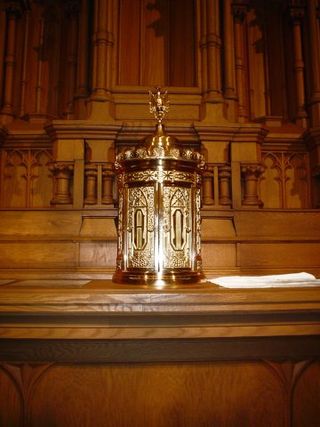
During the Liturgy of the Eucharist, the second part of the Mass, the elements of bread and wine are considered to have been changed into the veritable Body and Blood of Jesus Christ. The manner in which this occurs is referred to by the term transubstantiation, a theory of St. Thomas Aquinas, in the Roman Catholic Church. Members of the Orthodox, Anglican, and Lutheran communions also believe that Jesus Christ is really and truly present in the bread and wine, but they believe that the way in which this occurs must forever remain a sacred mystery. In many Christian churches, some portion of the consecrated elements is set aside and reserved after the reception of Communion and referred to as the reserved sacrament. The reserved sacrament is usually stored in a tabernacle, a locked cabinet made of precious materials and usually located on, above, or near the high altar. In Western Christianity usually only the Host, from Latin: hostia, meaning "victim", is reserved, except where wine might be kept for the sick who cannot consume a host.

The sacrament of holy orders in the Catholic Church includes three orders: bishops, priests, and deacons, in decreasing order of rank, collectively comprising the clergy. In the phrase "holy orders", the word "holy" means "set apart for a sacred purpose". The word "order" designates an established civil body or corporation with a hierarchy, and ordination means legal incorporation into an order. In context, therefore, a group with a hierarchical structure that is set apart for ministry in the Church.
Forty Hours' Devotion, in Italian called Quarant'ore or written in one word Quarantore, is a Roman Catholic liturgical action in which continuous prayer is made for forty hours before the Blessed Sacrament in solemn exposition. It often occurs in a succession of churches, with one finishing prayers at the same time as the next takes it up.
Roger Alan Jupp is a British Anglican bishop. He was the Bishop of Popondota from 2003 to 2005. He returned to parish ministry because of ill-health.

Lindsay Goodall Urwin OGS is an Australian Anglican bishop. Urwin was the area Bishop of Horsham in the Diocese of Chichester, in southern England, from 1993 to 2009, and was also the principal organiser of the annual Caister Conference. He was the administrator of the Anglican Shrine of Our Lady of Walsingham from 2009 to 2015. On 12 April 2015, his appointment was announced as vicar of Christ Church Brunswick in the Anglican Diocese of Melbourne, Australia. He was inducted on 15 September 2015.

A confraternity is generally a Christian voluntary association of laypeople created for the purpose of promoting special works of Christian charity or piety, and approved by the Church hierarchy. They are most common among Roman Catholics, Lutherans, Anglicans, and the Western Orthodox. When a Catholic confraternity has received the authority to aggregate to itself groups erected in other localities, it is called an archconfraternity. Examples include the various confraternities of penitents and the confraternities of the cord, as well as the Confraternity of the Holy Guardian Angels and the Confraternity of the Rosary.
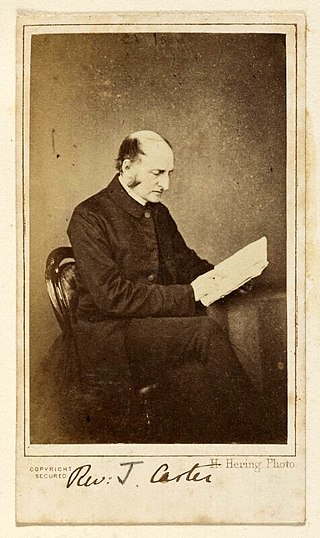
Thomas Thellusson Carter, often known as T. T. Carter, was a significant figure in the Victorian Church of England. He was responsible for reintroducing some Catholic practices to the church and being the founder of the Confraternity of the Blessed Sacrament. He also founded several charitable organisations. He was a prolific writer on church matters and a project exists to collect and collate all his writings. He was for 36 years the Rector of Clewer and an honorary canon of Christ Church Cathedral, Oxford.
Former religious orders in the churches of the Anglican Communion are those communities of monks, nuns, friars, or sisters, having a common life and rule under vows, whose work has ended and whose community has been disbanded. In a very few cases this is due to the termination of the work for which the community was established, but in most cases it is due to amalgamation or the death of the final remaining member of the community.
The Holy Week in Braga is the most imposing, attractive and famous among all in Portugal, and the most important tourist and religious event in the city of Braga. It is estimated that about 100.000 people attend the major processions. It combines harmoniously elements of the liturgy and of popular piety, ancient traditions and innovation. Since November 2011, this event is officially “Declared of Interest to Tourism”.
The fifteenth Lambeth Conference was an assembly of bishops of the Anglican Communion convened by the archbishop of Canterbury, Justin Welby, between 27 July and 7 August 2022. It was the first Lambeth Conference to be held since 2008.


















